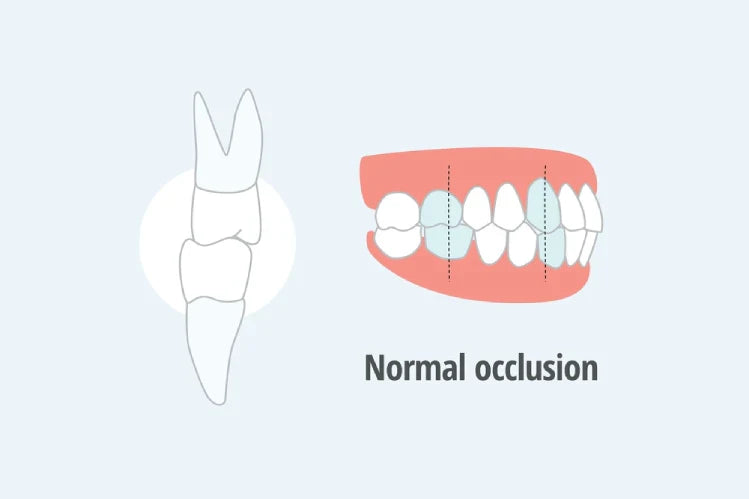
Table of Contents
-
What is Occlusion
-
Importance of Proper Occlusion
-
Occlusion and Malocclusion
-
Types of Occlusion
-
Angle Classification of Occlusion
-
Symptoms of Malocclusion
-
How to Treat Occlusal Problems
-
Get the Perfect Occlusion With Smilepath Australia
-
Wrap-up
-
FAQs
Occlusion in dentistry refers to the natural alignment of upper and lower teeth. Proper and ideal alignment of teeth is necessary for the functionality of the mouth and a healthy, aesthetic smile. Improper occlusion leads to various dental issues.
What is Occlusion
In the science of dentistry, occlusion is the terminology that refers to how upper and lower teeth fit or interact when biting, chewing, or even resting the jaw. It is basically the relationship between the upper and lower jaw and how the two sets of teeth “occlude” when the jaw functions or rests.
Importance of Proper Occlusion

Proper Occlusion is vital for dental health and overall well-being. It affects how you look, how you smile, and how you function. The bullet points given below explain the importance of occlusion:
Appearance
Dental occlusion is important for the appearance of the face. If teeth are not aligned properly, it affects facial symmetry because dental occlusion has a direct relation with lips, chin, and cheekbone. Proper occlusion gives the face and jaw a symmetrical appearance and more enhanced facial features.
Efficient Chewing
Occlusion is vital for the proper chewing and grinding of food. People with good occlusion often possess a healthy digestive system because what they eat is properly chewed. A well-defined bite ensures even pressure on all the teeth, making chewing smoother and more efficient.
Importance in Early Age
In early ages, when the bones are developing, it is important to have good occlusion. Any irregularities during the developing phase can cause damage to oral health. Oral health issues at such a young age may lead to bigger health problems later in life.
Speech and TMJ Functioning
With good occlusion, the tongue is placed in the correct position, and teeth are properly aligned. Both are important for normal speech. If the teeth don't occlude properly, they affect tongue placement and cause speech impediments like lisping. Also, having good occlusion avoids any muscle and jaw strain, allowing the TMJ to function properly and effectively.
Occlusion and Malocclusion

Have a look at the difference between occlusion and malocclusion to gain a proper understanding of both.
| Occlusion | Malocclusion |
|---|---|
| Occlusion refers to the normal alignment of upper and lower teeth when the mouth is closed. | Malocclusion refers to the improper alignment of teeth which leads to bite issues. |
| It is a natural and healthy dental condition. | It is a dental disorder and requires proper treatment. |
| It ensures proper functionality of the mouth. | It can cause difficulty in chewing, biting, and speaking. It also causes muscle strain and jaw pain. |
| It allows you to maintain good oral health. | It increases the risk of cavities, tooth decay, and gum disorders. |
Types of Occlusion
Occlusion has three types:
Static Occlusion
Static occlusion describes the contact between the teeth when the jaw is not moving.
Dynamic Occlusion
Dynamic occlusion describes the contact teeth make when the mandible is moving.
Centric Occlusion
Centric occlusion describes your lower jaw’s position when all the teeth come together while taking a bite.
Angle Classification of Occlusion
Following are the three classes of occlusion:
Class 1 Occlusion

Class 1 occlusion (orthogenetic) involves a normal relationship between the upper and lower teeth and the jaw. However, it may include some spacing or overlapping of teeth. Minor treatments can fix this.
Class 2 Occlusion

Class 2 (retrognathic) is normally considered a malocclusion and it happens when the upper teeth stick out over the lower teeth. This kind of malocclusion has a significant effect on bites and needs early dental intervention.
Class 3 Occlusion

Class 3 (prognathic) is a type of malocclusion or bite issue in which lower teeth stick out over the upper teeth. It should be treated in time to avoid any future oral health problems.
Symptoms of Malocclusion
Following are some of the signs that indicate an occlusal problem:
- Headaches and migraines
- Dental sensitivity
- Tooth damage
- Face muscle and TMJ pain
- Bite issues
- Teeth misalignment
- Asymmetrical face and jaw
- Speech difficulty
How to Treat Occlusal Problems
Occlusion problems can be treated in various ways. Some of them are described below:
Clear Aligners

Clear aligners work best for mild to moderate occlusion problems. These invisible trays gently exert pressure on teeth and jaw, shifting them to their ideal state. They are comfortable and affordable, giving you the smile you were always looking for. Another good quality of clear aligners is that they are removable, allowing you to enjoy your meal and maintain hygiene.
Braces

Braces have been used to fix misalignment of teeth for decades. These are made up of metal or ceramic and are applied onto the teeth so they gradually exert pressure and shift teeth to their naturally aligned position. These are effective for treating teeth misalignments but are very uncomfortable and require a lot of patience and consistency to treat.
Equilibration

Occlusal equilibration is the process of getting your bite balanced. This allows the jaw and teeth to function effectively with a minimal amount of strain on the joint, muscle, or teeth. This may involve filing down the teeth or adding bonding material to enhance the surface of the teeth.
Restorative Dentistry

Dentists often use restorative methods to repair the damaged teeth or replace the missing ones. These are cosmetic methods that give teeth their ideal and natural appearance. Some common kinds of restorative dentistry are crowns, bridges, or dental implants.
Get the Perfect Occlusion With Smilepath Australia

Smilepath considers the dental requirement for those who are fed up with occlusal problems and want a permanent solution for them. Keeping in view the convenience and comfort of its valuable customers, Smilepath has come up with the most affordable clear aligners. By adhering to the wear time of 22 hours a day, you can get your teeth aligned within four to six months.
Why Choose Smilepath?
Following is why Smilepath Australia Clear Aligners are the best option for Australians with malocclusions:
Advanced Technology
By incorporating the latest technology, we make sure our customers get what they are looking for. Our 3D smile projection shows you how the smile will look even before the treatment has started. How exciting is that!
Payment Refund
Our payment policies are very customer-friendly. We offer a full refund if you have paid for the treatment plan and, after receiving your impressions, our experts find that you are not eligible for it.
Faster Results
Getting a perfectly occluded smile as early as possible is now achievable with Smilepath Australia Clear Aligners. These aligners are made to end long-term treatment fatigue by fixing the malocclusion within 4-6 months, depending on the severity of the case.
How Smilepath Clear Aligners Treatment Works
Smilepath Clear Aligner treatment is made to be easy and convenient to ensure your comfort and satisfaction. Look at the image below to know how the procedure works:

Wrap-up
A perfect occlusion is a dream of almost every person on this planet. Smilepath Australia is turning these dreams into reality. With our cutting-edge technology, we make sure you get a good occluded smile with minimal or no discomfort at all. Don't let your dental issues hold you back because you deserve a perfect smile. Order our comfortable and affordable clear aligners now!
FAQs
Occlusion refers to the alignment of teeth so that both upper and lower teeth perfectly fit and interact when biting or resting.
Occlusion is divided into 3 types: Class 1 (Normal occlusion), Class 2 (upper teeth stick out over the lower teeth), and Class 3 (lower teeth stick out over the upper teeth).
Tooth malocclusion is mostly treated by clear aligners, braces, equilibration, or restorative dentistry. However, clear aligners like those provided by Smilepath Australia are the most comfortable and affordable solution to treat malocclusions.
Citations:
White, J. (2024, November 22). What is an Occlusion in Dentistry? Definition & Common Types. Bellevue Hill Dental. https://bellevuehilldental.com.au/what-is-occlusion-in-dentistry/#:~:text=Poor%20occlusion%20can%20lead%20to,when%20teeth%20are%20first%20developing.
Dental, S. (2022b, June 20). What are the symptoms of Occlusal issues? Sharrow Dental. https://www.sharrowdental.co.uk/blog/what-are-the-symptoms-of-occlusal-issues/
Occlusion - An overview of dental Anatomy - Dentalcare. (n.d.). http://dentalcare.com/en-us/ce-courses/ce500/occlusion








 Australia
Australia New Zealand
New Zealand Malaysia
Malaysia English
English Portuguese
Portuguese English
English English
English English
English English
English English
English Canada
Canada